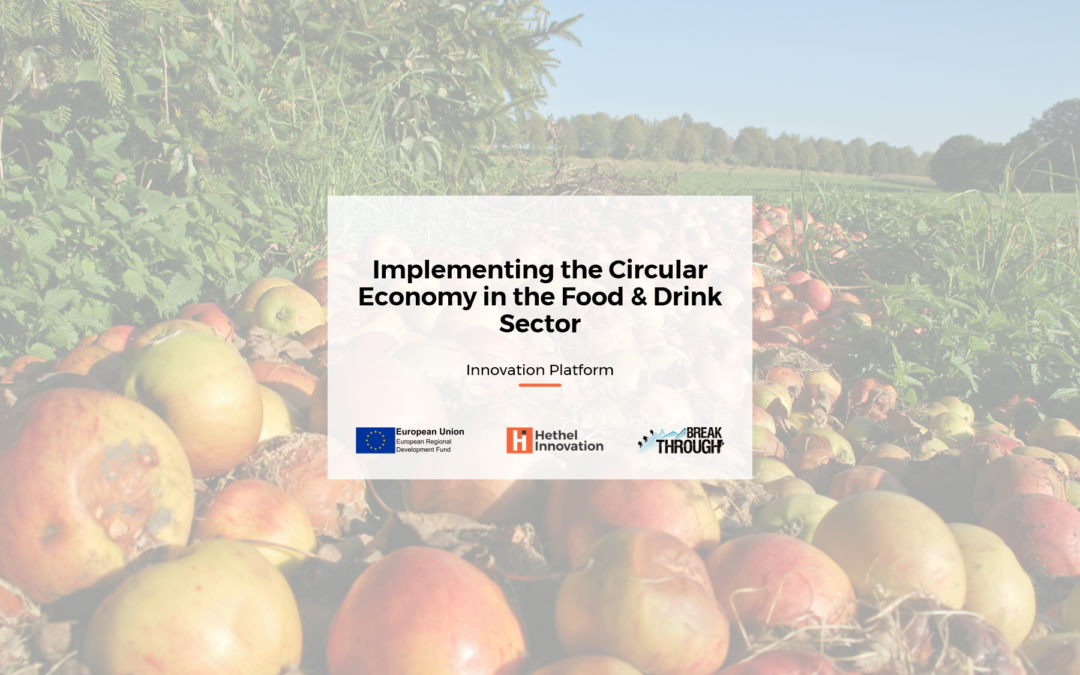On September 24th Hethel Innovation launched its newest innovation platform, the Circular Economy in Food and Drink (CEFAD). It has been developed in co-operation with the University of East Anglia and the Food Enterprise Park, where Hethel Innovation will manage the soon-to-be constructed Food Innovation Centre.
What is the CEFAD Platform?
The platform has been developed following conversations with food and drink businesses in the region and the Food Enterprise Park. The platform aligns to the local economic strategy developed by the New Anglia LEP, creating opportunities for growing and innovative businesses to locate in the region, and provides the region with an opportunity to adopt a much-needed principle which could label Norfolk and Suffolk as an early adopter of the Circular Economy model.
Accelerated by the effects of Brexit and Covid, the ability to employ labourers to pick produce will become more difficult, and an increased amount of food waste could create challenges for businesses. This challenge represents an opportunity for the platform. Creating an alternative revenue stream, should waste be created, could allow food businesses to shift entirely, purposing producing ‘waste’ to be repurposed into another product/solution that reduces the strain on other scarce resources. An approach that may not be received well by some due to the use of energy to produce ‘waste’, the approach has the potential to reduce the extraction of rare and scarce materials.
“The Circular Economy in Food and Drink (CEFAD) platform is an opportunity for businesses in the sector to discover new ways of reducing their carbon footprint, removing waste from their operations and introducing new revenue streams. With Covid having disrupted almost every business in some form, the platform will help businesses rebuild more effectively, and remove linear-based risks.”
Jordan Sharman
But why should businesses look to shift to a Circular Economy?
It is perhaps often misunderstood by businesses that the circular economy only brings an environmental or societal benefit, whereas there is a very real possibility for businesses to benefit financially. Research by WRAP has found that “For every £1 invested in waste reduction, a £14 yield is returned.” This amount is realised through removing the cost of unsold food, reducing the cost of disposing waste, selling imperfect produce, and commercialising waste and by-products. – The emphasis of this platform.
What is the purpose of the platform?
The meeting presented the attendees with the proposed actions of the platform, highlighting the research that will be conducted to allow businesses to repurpose ‘waste’ streams and by-products and introduce new revenue streams. The platform will provide the following:
- Create New Revenue Streams: Conducting research to identify ways to repurpose waste and by-products.
- Connect Businesses to Scientists: Accelerating the validation of research and commercialisation.
- Tenancy Opportunities: Housing spinouts at the Food Innovation Centre.
What is Success for the Platform?
Whilst the platform focuses on the introduction of new revenue streams, success can be defined in a number of other ways:
- Creation of Spinouts
- Increasing Revenue
- Reducing Costs
- Supply-Chains Developed/Secured
- Mitigating Linear-Focused Risks
- Creating a Consistent Vehicle for Start-Ups into the Food Innovation Centre
- Supporting the Development of a Local Strategy that Encourages Innovation
Who were the first cohort of businesses to receive research?
The first cohort of businesses supported through the platform included:
- Condimentum – Mint, Mustard and more. Growing and processing fresh and natural flavourings and condiments for food.
- Keelings – A major produce grower and distributor, including strawberries, raspberries and peppers.
- Old Hall Farm – Local farm using regenerative agriculture for producing raw milk, as well as on-site farm shop and café.
- Goodery – Norwich-based startup providing a platform for the purchase and delivery of organic and ethically sourced goods.
The businesses listed provided Hethel Innovation and UEA Researchers with a business case, highlighting the desire to repurpose their food waste items and by-products. The solutions discovered included the ability to repurpose food items for medicinal use, water filtration and dye extraction; all applications which serve a societal benefit.
What next?
The next session shall be taking place on January 21st 2021, and for an invite to attend, please contact Jordan at jsharman@hethelinnovation.com.
How can you get involved?
Following a successful first session we are also currently looking for our next cohort of food and drink businesses to support, where we will conduct targeted research to commercialise waste streams. Get in touch with Jordan if you would like to get involved.


